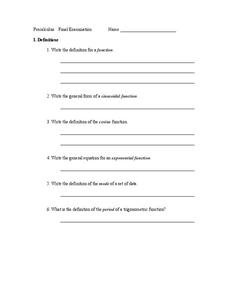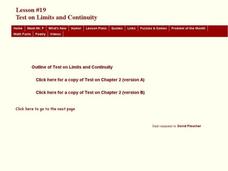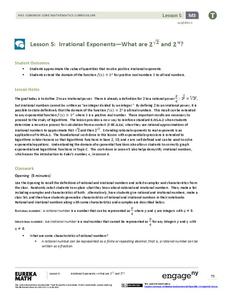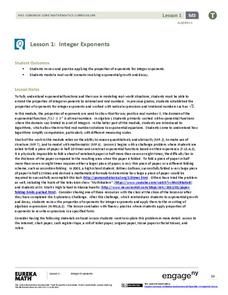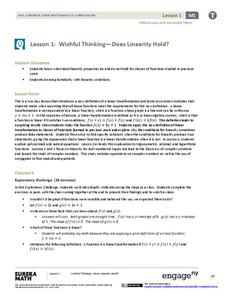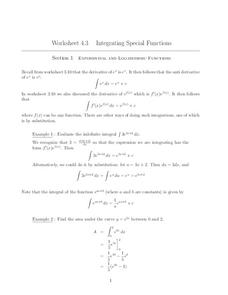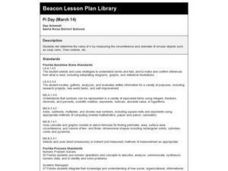Curated OER
Integrating Functions
In this math worksheet, students find the answers to the functions that includes integration and trigonometry. They use the examples for help with the special functions.
EngageNY
Mid-Module Assessment Task - Algebra 2 (Module 3)
The 15th installment of a 35-part module is a mid-module assessment task. Covering concepts in the first half of the module, the task acts as a formative assessment, providing you with valuable information on how learners are doing.
EngageNY
End-of-Module Assessment Task - Algebra 2 (Module 3)
The last installment of a 35-part series is an assessment task that covers the entire module. It is a summative assessment, giving information on how well pupils understand the concepts in the module.
Curated OER
Math Handbook: Calculus
If only there was a reference that listed all the formulas covered in calculus. Luckily, there is. This comprehensive 197-page handbook provides formulas and explanations for all topics in AP Calculus or in a standard college calculus...
EngageNY
Modeling with Exponential Functions
These aren't models made of clay. Young mathematicians model given population data using exponential functions. They consider different models and choose the best one.
Curated OER
Modeling Natural Disaster with Mathematical Functions
Ninth graders investigate the functional relationship of different environmental phenomena. For this math lesson, 9th graders create models of various natural disasters. They use logarithmic and exponential functions to interpret...
Curated OER
Precalculus Exam
For this precalc lesson, students write out definitions, identify functions, solve integrals and derivatives and graph trig functions as they relate to angles. This is a final exam for precalculus. There are 80 questions on this exam.
EngageNY
Translating Graphs of Functions
If you know one, you know them all! Parent functions all handle translations the same. This lesson examines the quadratic, absolute value, and square root functions. Pupils discover the similarities in the behavior of the graphs when...
Curated OER
Test on Limits and Continuity
Students review concepts of logarithms for their test. In this calculus lesson, students review inverse function, limits, derivatives and solving logs equations. They review the chain rule and domain and range of inverse logs.
EngageNY
Bacteria and Exponential Growth
It's scary how fast bacteria can grow — exponentially. Class members solve exponential equations, including those modeling bacteria and population growth. Lesson emphasizes numerical approaches rather than graphical or algebraic.
EngageNY
Irrational Exponents—What are 2^√2 and 2^π?
Extend the concept of exponents to irrational numbers. In the fifth installment of a 35-part module, individuals use calculators and rational exponents to estimate the values of 2^(sqrt(2)) and 2^(pi). The final goal is to show that the...
EngageNY
Integer Exponents
Fold, fold, and fold some more. In the first installment of a 35-part module, young mathematicians fold a piece of paper in half until it can not be folded any more. They use the results of this activity to develop functions for the area...
EngageNY
Percent Rate of Change
If mathematicians know the secret to compound interest, why aren't more of them rich? Young mathematicians explore compound interest with exponential functions in the twenty-seventh installment of a 35-part module. They calculate future...
EngageNY
Base 10 and Scientific Notation
Use a resource on which you can base your instructional activity on base 10 and scientific notation. The second installment of a 35-part module presents scholars with a review of scientific notation. After getting comfortable with...
EngageNY
Wishful Thinking—Does Linearity Hold? (Part 1)
Not all linear functions are linear transformations — show your class the difference. The first activity in a unit on linear transformations and complex numbers that spans 32 segments introduces the concept of linear transformations and...
Teach Engineering
Light Intensity Lab
Let there be light. The last installment of a seven-part series has pupils conduct an experiment on light attenuation through different numbers of transparency sheets. They then relate the results back to how X-rays measure bone density.
Curated OER
TI-89 Activities for PreCalculus and AP Calculus
Using the TI-89 calculator, students explore the statistical, graphical and symbolic capabilities of the TI-89. Students investigate topics such as solving systems of equations, finding inverse functions, summations, parametrics and...
Curated OER
Dead Body Math
Learners solve the mystery of dead Mr. Potato Head using physics and algebra. They discuss Newton's Law of cooling as it applies to the mystery scenario involving a cooling baked potato as the "victim". They manipulate algebraic...
Curated OER
Integrating Special Functions
In this math worksheet, learners practice reading the examples of integrating special functions. The examples have the formulas included.
Curated OER
Pi Day (March 14)
Fourth graders determine the value of ? by measuring the circumference and diameter of circular objects such as soup cans, Oreo cookies, etc..
Curated OER
Calculus
Students make an inquiry with the aid of technology into the concept of functions. The emphasis of the activity is on the interplay between the geometric and analytic information.
Stefan Warner and Steven R. Costenoble
Finite Mathematics & Applied Calculus: Derivatives of Logarithmic and Exponential Functions
Students learn how to compute the derivative of logarithmic and exponential functions. The tutorial explores the calculus concepts through notes and examples. Review exercises and a topic summary are included.
Interactive Mathematics
Interactive Mathematics: Derivatives of Logarithmic Functions
The formulas for finding the derivatives of logarithmic functions are presented, then demonstrated with several examples. The solutions are hidden to allow students to work the problems without help.
Hofstra University
Derivatives of Logarithmic and Exponential Functions
This site explains the derivatives of standard logarithmic and exponential functions. The site has example problems and grades your work, explaining errors you may have made when attempting the problem.








